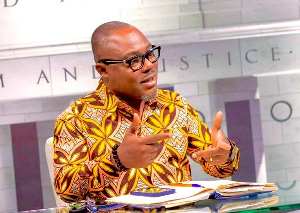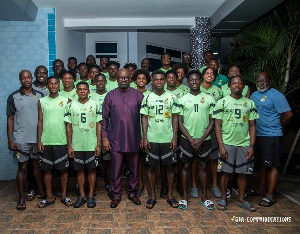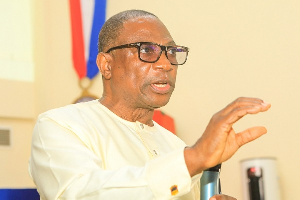By Kwame Okoampa-Ahoofe, Jr., Ph.D.
It is rather pathetic to hear Dr. Maxwell Awuku wax totally peripheral and irrelevant about what the founder of the so-called Citizens' Movement vacuously presumes to have been President Nkrumah's "Seven-Year Development Plan" (See "'Implement Nkrumah's 7-Year Dev. Plan'" Graphic Online 2/25/14). Rather vacuous and pathetic because Dr. Awuku does not enunciate to his audience precisely what Nkrumah's widely purported "7-Year Development Plan" entailed. He only quotes bits and pieces from the popularly deposed late dictator's speeches about the existence of such a plan, and hopes that most Ghanaians are gullible and credulous enough to buy such rhetorical piffle.
As an intellectual, one would expect the Citizens' Movement founder to have seleceted at least a couple of the most significant items in the plan and critically examined what made them uniquely conducive or suitable for the economic and technological advancement of the country. I make the preceding observation because I have personally perused the so-called Seven-Year Development Plan which Nkrumah essentially lifted hook, line and sinker from the erstwhile Soviet Union. What made the plan unsuitable for Ghana's particular cultural and technological context was primarily because it did not take practical account of the fact of the Soviet Union at the time, and even presently, being significantly far economically and technologically better developed than a Third-World Ghana.
In other words, our country did not possess an adequate level of skilled labor to successfully implement this shamelessly plagiarized Soviet development plan. What is more, as I have had several occasions to underscore previously, by 1961, President Nkrumah's grandiose agenda for continental African unification had effectively consumed most of the country's fiscal resources. The extant Governor of the Bank of Ghana, I believe it was Mr. Frimpong-Ansah, would inform a hopelessly downcast, albeit blindly profligate, President Nkrumah that Ghana was totally bankrupt.
And so it is not clear precisely where woefully misguided Nkrumah fanatics like Dr. Awuku suppose the money for such capital-intensive development plan would have come from. We need to also, once again, underscore the incontrovertible fact that the 1966 military overthrow of the Nkrumah-led Convention People's Party (CPP) government was the best thing that happened to Ghana in the twentieth century. It was even far more significant than Nkrumah's declaration of the country's sovereignty on March 6, 1957. For what really happened after the latter date was that Ghana had been effectively and extortionately plunged into a one-party dictatorship and an immitigably and incorrigibly corrupt neocolonial dictatorship that made traditional British colonialism seem like a god-sent.
Even as Mr. J. A. Braimah, a former Nkrumah associate, was to poignantly declare vis-a-vis Nkrumah's benightedly vicious treatment of Dr. J. B. Danquah, the British colonialists had practiced a relatively far more democratic governance of their African subjects, especially where civil rights were concerned, far more than the Soviet-chaperoned juggernaut that was the so-called Convention People's Party. Indeed, Nkrumah may well have had progressive development plans for Ghana on the proverbial drawing board, but it can scarcely be disputed that his focus of implementation was practically zilch/zip.
Instead, the egomaniacal Ghanaian leader preferred to quixotically spend the bulk of his people's money and human and natural resources on the schematic abstractions of pan-Africanism. Indeed, what needs to be interminably emphasized is the fact that Nkrumah was clinically possessed of a toddler's imagination, the kind of warped imagination that envisaged the wholesale transplantation of high-end Western science and technology bereft of the requisite and commensurate managerial know-how. As a result, the Show Boy's job-creation programs largely benefited expatriate Europeans who were hired at three-fold the prevailing labor wages and salaries.
This is the irresponsible leadership-deterrent story that the latter-day Cii-Pii-Pii-ites ought to be telling our progressive and democratically minded youths, if Ghana is to have a fighting chance on the road to a meaningful and rapid socioeconomic, cultural and technological advancement.
_____________________________________________________________
*Kwame Okoampa-Ahoofe, Jr., Ph.D.
Nassau Community College of SUNY
Garden City, New York
Feb. 25, 2014
E-mail: okoampaahoofe@optimum.net
###
Opinions of Thursday, 20 March 2014
Columnist: Okoampa-Ahoofe, Kwame














